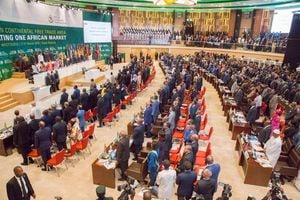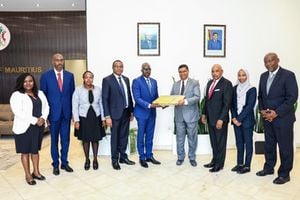
Opposition leader Raila Odinga one of the frontrunners to chair African Union Commission
The final contenders for the upcoming race for the Chairperson of the African Union Commission’s seat may be narrower than thought. But the list of issues each candidate is pitching reflects the continental body’s enduring challenges.
Ahead of the August 6 deadline, it is turning out that Somalia’s Fawzia Adam and Seychellois contender Vincent Meriton will fall off the race, leaving Kenya’s Raila Odinga and Djibouti’s Mahmoud Ali Youssouf. Two sources in the Somali government indicated Somalia will not nominate Ms Adam, a former Foreign Minister, but they both did not provide reasons. Another source had indicated Somalia had chosen to back another candidate from another country.
Ms Adam herself did not respond to The EastAfrican inquiry on her candidature.
On July 22, the Seychellois Foreign Ministry confirmed Mr Meriton, a former Vice-President, had pulled out of the race, citing health concerns.
“The Government of the Republic of Seychelles wishes to inform that Mr Vincent Meriton, former Vice President of the Republic of Seychelles, has decided not to proceed with his candidature to the position of Chairperson of the African Union Commission (AUC) at the elections to be held during the 38th Ordinary Session of the Assembly (Summit) of the African Union in February 2025, due to rising health concerns,” the statement said.
With the window for more candidates closing, the race will so far be between frontrunners Odinga and Youssouf. They both presented their documents to the African Union Legal Counsel on Monday, July 29.
However, grapevine was still showing Tanzania’s former Foreign Minister January Makamba may join the race. Neither he nor Tanzanian government officials have confirmed it.
Under the rules of procedure, they had to first submit the documents to the Dean of Eastern Region, Mauritian Permanent Representative to the African Union, Mr Dharmraj Busgeeth, and later to the Legal Counsel of the AU Commission. The Eastern region will exclusively contest for the African Union Commission Chairperson’s seat, under the new rules meant to rotate seats between regions, and to ensure the continental body adequately reflects the face of its countries.
On Monday, the Kenyan Ministry of Foreign and Diaspora Affairs said it had nominated Odinga because he has sufficient experience to address the continent’s challenges.
“Africa continues to experience economic distress, environmental challenges, conflicts, terrorism, and general social discord, exacerbated by geopolitical competition.
“Perhaps at no time in the history of the African Union has the continent needed a more visionary leader, an accomplished statesman and a quintessential Pan-Africanist,” Kenya said.
The documents filed included CVs, statements of vision and how they intend to address emerging challenges on the continent. It is the first step for aspirants to show intent to serve as leaders of the African Union Secretariat.
Mr Odinga’s priorities and those of his Djiboutian rival target the continent’s troubles, including those of the Commission. Odinga says he wants to focus on African integration and infrastructure development, drawing on his experience as a former Minister for Energy and later African Union High Representative for Infrastructure Development. Youssouf did promise o pursue a similar thing but also indicated that he will utilise private sector participation to fulfill the use of the African Continental Free Trade Area (AfCTA), a 2018 treaty meant to expand intra-Africa trade but which requires infrastructure rebuild.
Mr Odinga promises to help Africa’s economic and agricultural transformation and enhance intra-Africa trade, currently just at 15 percent. He also wants the AU to be more financially independent, perhaps touching on an issue that has been AU’s headache for the last 20 years. It relies mostly on donors, something that is often blamed for its sluggish response to crises.
Odinga has pledged to promote gender equality by utilising more women in critical roles of the AU as well as supporting gender equality programmes among member states.
Both Odinga and Youssouf promise to focus on climate action to mitigate the bite of climate change, strengthen organs of the AU for peace and security response as well as utilise the youth dividend.
The Djiboutian spoke of promoting policies for a transition to a green economy, with a focus on renewable energy, ecosystem protection and sustainable agriculture. Odinga spoke of supporting local solutions to adapting and mitigating climate change.
Odinga promises to elevate the youth, seeing that the continent is mostly young and in need of skills to address joblessness.
Youssouf, Djibouti’s current Foreign Minister, says he will instil responsible leadership at the AU, celebrating diversity and merit, while establishing a culture of accountability and transparency. The AU has suffered recent governance issues, including claims of favouritism.
But the AU’s role, Odinga admits must be complimentary to that of regional economic blocs, suggesting some kind of bottom-up integration proposal that also focuses on strengthening the relationship between blocs and the AU. Youssouf promised to tackle insecurity by addressing root causes: poverty and inequality for example.
Both proposals may need money and political will, which is why voting patterns across the continent will determine who actually implements their vision. It will also depend on who they align with. The Deputy Chair of the Commission will have to come from the northern region. And if a male contender wins the chair, the deputy will have to be female, under new rules of balancing gender representation at the continental secretariat.
Yet the candidates will not be confirmed as contenders yet, until they pursue other stages including an interview with a panel of experts.
The Panel of experts has developed a set of requirements. “This includes generic leadership skills and competencies as well as expert and thematic skills for each portfolio. The assessment process for all candidates is based on the skills and competencies identified for each senior leadership position,” said a dispatch from the AU in May.
There are four members of the Panel, although the final list should have five. They include Burundian Academic Prof Paul Ngarambe, Ethiopia’s former Permanent Representative to the African Union Konjit SineGiorgis, South African diplomat Nozipho Joyce Mxakato-Diseko. and Patrick Hayford, a retired Ghanaian diplomat for the Western region.
Since 2017, the African Union also requires that candidates, besides applying formally and being vetted by the panel, must also debate live on television in an Africa Leadership Debate known as MjadalaAfrika. The AU says this allows candidates to outline their vision of “how they will lead the transformation of Africa through the implementation of the AU Mandate and Africa’s Agenda 2063.”
All the eight positions of the Commission -- chairperson, deputy and six commissioners -- are up for grabs. But each region will be given slots based on what leaders agreed on as a fair “principle of inter-regional rotation.”
“Each region determines its own procedure for nominating candidates for the portfolios for which it is eligible,” the AU said in May. The region then hands in its list to the panel of experts by August 6.
“Only names of candidates submitted by the region will be considered in the pre-selection process undertaken by the Panel of Eminent Africans. Further, only member states that are not under AU sanctions are allowed to submit candidates.”
It means countries currently suspended for committing coups, including Sudan, Gabon, Niger, Mali, Burkina Faso and Guinea are ineligible to compete for any slots.









